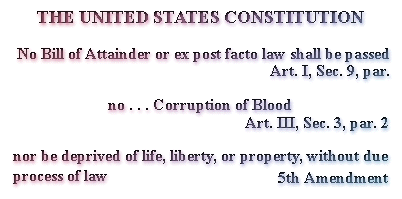

by
Kirt Sechooler Dec, 1995

Reality has a way of catching up with you, the way the ground catches up with an
airplane that runs out of fuel. In just such a manner, now half way through the last
decade of the twentieth century, the political philosophy of liberalism has begun its
final descent into oblivion.
Flawed Perception
The long decline of contemporary liberalism dates back to the late 1960s and to the early
1970s when the Democratic Party fell victim to a giant, if common misperception. That
error in perception led to the idea that you could right historical injustice, whether
actual or perceived, by punishing the descendants of the perpetrators of that alleged
injustice. This idea stems from a fundamental flaw in the way too many human beings
organize reality. People tend to believe that the genetic offspring of any group of people
are the same as the original people themselves; they are, of course, in fact not the same
people, but only their descendants.
When the misperception described above was subsumed into the political philosophy of
the post 1960's Democratic Party, the result was a massive political disaster for the
party. The Democratic Party of the 1970s adopted both an underlying emotional tone and an
overt political agenda that sought to punish white males for political and economic sins
of the past. This represented one of the greatest mistakes in the history of American
politics.
GIs
There was a very strong generational aspect to politics in the late sixties. The
established political and economic leadership of the day was not only almost exclusively
male, but it was also made up almost completely of members of what we now call the G.I.
Generation, those individuals who came of age in the Great Depression of 1930s and
with World War II.
Silents & Boomers
The leaders of the anti-Vietnam War movement, the Civil Rights movement and later the
Women's movement, as well as the counter culture in general, were in contrast largely
members of the Silent Generation. The Silent Generation was the generation
born between the mid 1920s and mid 1940s that came of age in the late 1940s and 1950s. And
the rank and file of these movements was composed largely of post World War Two Baby Boomers
(the first wave of whom reached college around 1964).
For the last three decades, American politics has been driven by the interactions of
these three generations, the G.I.s, the Silents, and the Boomers, a
fact that is, however, about to change.
Affirmative Action
The people who seized control of the
Democratic Party in the early 1970s viewed the power structure they had to politically
confront as being composed exclusively of white males. The programmatic response to this
dilemma was affirmative action. When the white males in the existing power structure
adopted affirmative action as a political program, however, liberalism was fatally
compromised.
The iron truth of the past thirty years has been that the white males of the G.I.
Generation and of the succeeding Silent Generation have not been adversely
effected by affirmative action at all, while the males of the Boomer Generation and
of Generation X have been politically and, perhaps more importantly,
psychologically disenfranchised by it.
Angry White Males
Many younger white men feel, with complete justification, that they are being punished for
crimes that they did not commit, crimes that occurred, in many cases, long before they
were born. Additionally, over the last two decades, these younger Boomer and Generation X
men have seen real incomes fall far below what their G.I. fathers and older Silent
Generation brothers made at comparable ages. Yet with all of this, there remains no
political vehicle through which they can express their legitimate economic frustrations.
Instead, they are stereotyped by the mass media as "angry white men" in order to
reduce their very existence to an editorial cliche and thus avoid dealing with their
grievances in an honest manner.
The result of this practice is transparently clear. Since the late 1960s, younger white
men have essentially stopped voting for the Democratic Party. And since then, the
Democratic Party has won the Presidency only twice and has lost it five times, with its
two victories being compromise Southern Democrats too politically weak to govern
effectively. And now, at the end of this process, the Democrats have lost both Houses of
Congress for the first time in forty years.
Younger men will not vote for a party that, in addition to having failed to represent
their economic interests, has created a political climate that seeks to victimize them for
conditions that they did not create. Is it reasonable to expect any psychologically normal
individual to vote for a political party that seeks to punish them for a situation
allegedly created by their ancestors?
A new political configuration is about to be born. Whether that new
configuration will include a reconstituted Democratic Party or a new and as yet unknown
third party is not clear. But one thing is certain, the deconstruction of post 1960s
liberalism and with it the old Democratic Party has now past the point of no return. mmm
Comments
| Archive | to the top |